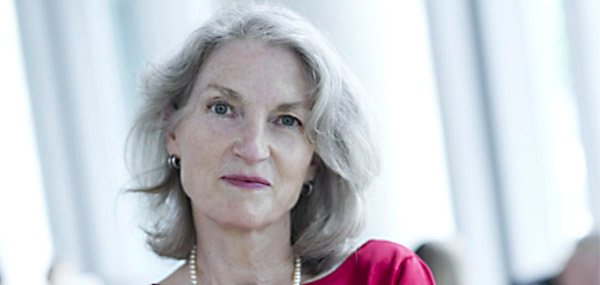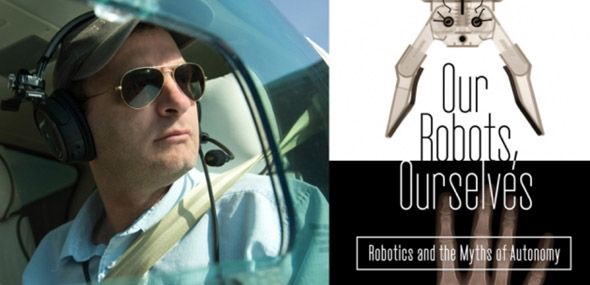SOCIAL INNOVATION
A Sampler of MIT Research on The Future of Work, Jobs, and Economic Equity

Research to Policy
The research of MIT's social scientists in the School of Humanities, Arts, and Social Sciences informs policymaking in many areas, among them: economic equity and well-being; jobs and the future of work; healthcare, poverty alleviation; the environmnent and climate; education; energy, food and water; elections, electoral infrastructure, and national security.
INFLATION
WGBH
On inflation and the middle class | Jonathan Gruber
Gruber discussed the latest on inflation, including the potential strategies of the Federal Reserve Bank and why the middle class is being left behind. He also explained the economic impacts of government failure and whether the United States is heading in that direction.
Commentary at WGBH
THE NEW YORK TIMES
Is ‘Greedflation’ rewriting economics, or do old rules still apply? | David Autor
"Market concentration is a longstanding problem, yet we’ve had close to no inflation for two decades,” ssyd David Autor, an economics professor at MIT. “So it cannot be that market concentration suddenly explains inflation.”
Story at The New York Times
WGBH
On the state of inflation | Jonathan Gruber
MIT economist Gruber weighs in on the state of inflation and how costs got so high in the first place.
Conversation at WGBH
RECESSION?
FORBES
Recession? The major fear is spreading fear itself | Peter Diamond cited
Diamond, Institute Professor and Professor of Economics Emeritus, received the Nobel Prize for clarifying that there are many levels of employment at which supply equals demand, including many that are very low. Diamond’s example: workers need to search for employers and employers need to search for workers. If neither party thinks the other is searching, each will sit on their hands, meaning too few people will be hired and too little will be produced.
Story at Forbes | Peter Diamond
PROPOSING SOLUTIONS
DEVELOPMENT ECONOMICS
J-PAL launches Jobs and Opportunity Initiative
The initiative aims to answer pressing questions facing policymakers, employers, and job seekers, focusing on three areas: job training and matching, job creation, and the future of jobs. Learn more
QUARTZ + FORBES
Study finds B-schools teach managers to keep wages low | Daron Acemoglu cited
A new study from the National Bureau of Economic Research released March 28 revealed that managers with a business degree (in both the U.S. and Denmark) are not significantly better at running a company than those without one. They were, however, less prone to raise wages.
Story at Quartz | Story at Forbes
INNOVATION MEET ORGANIZATION
Van Reenen studies the creation and use of technology from lab to workplace.
“Technology can respond to the social and economic environment. There are policies which can be used to spur the creation of new technologies.” Creating new technologies is one thing; using them well is another.
Story at MIT News
ANALYSIS
What everyone needs to know about the economy | David Autor
Ford Professor of Economics David Autor answered questions about economic issues in a Quora forum online, providing expert insight into some of our most pressing issues.
Discussion on Forbes / Quora Forum | David Autor's website
DEVELOPMENT ECONOMICS
Economics for hard times | Abhijit V. Banerjee and Esther Duflo
The Nobel laureates make the case for intelligent, respectful interventionism.
Story by Peter Dizikes, MIT News | About the book
LABOR MARKET AND DEVELOPMENT
Economy in Society: Essays in Honor of Michael J. Piore | MIT Press, 2012
In Economy in Society, five prominent social scientists honor Michael J. Piore, MIT Professor of Political Science, in original essays that explore key topics in Piore’s work and make significant independent contributions in their own right. Piore is distinctive for his original research that explores the interaction of social, political, and economic considerations in the labor market and in the economic development of nations and regions. The essays in this volume reflect this rigorous interdisciplinary approach to important social and economic questions.
About Economy in Society
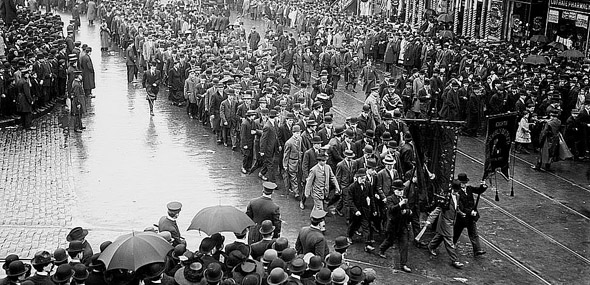
Labor Day parade, New York City 1909; Library of Congress Prints and Photographs Division
LABOR ECONOMICS
Why are workers getting smaller pieces of the pie? | Autor and Van Reenan
Market concentration in the form of “superstar” firms has been lowering labor’s share of GDP in recent decades, a new study finds.
Story at MIT News
PREPARING FOR CHANGE
Why do people earn what they earn? | David Autor
"As MIT economist David Autor notes in a new paper, leaders in the late 1800s and early 1900s, particularly in the farm states, anticipated the coming tectonic shift in the economy and worked to prepare the population for it."
Story at The Boston Globe
INFRASTRUCTURE THAT ENABLES RISK-TAKING
How to succeed in the innovation era | Daron Acemoglu
In an article in The New York Times, MIT economist Daron Acemoglu says that to succeed in the innovation era we need to build institutions that help us stay flexible in the midst of turbulent lives, including a stronger safety net that enables us to take entrepreneurial, educational, and career risks; because a society that encourages risk will intrinsically be wealthier over all.
Article in the New York Times
IMPACT OF CONCENTRATED INDUSTRIES
One reason workers are struggling even when companies are doing well | David Autor
A new study co-authored by MIT economist David Autor studied 700 industries from 1982–2012 and found that “the more concentrated an industry had become, the larger the decline in labor’s share.”
Story at The Atlantic | Related stories at Bloomberg News and The New York Times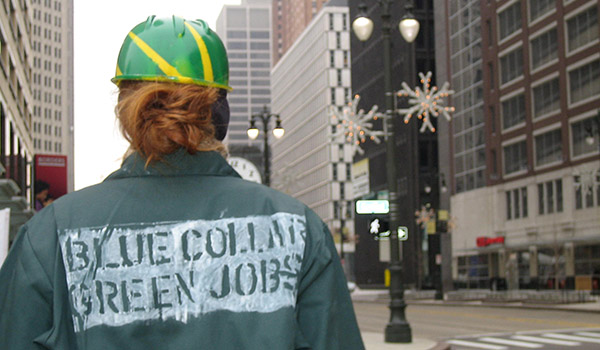
Photo via Flickr/ courtesy of RainForestAction
HEALTH AND WORK
One simple way to reduce suicides: Increase the minimum wage
In a paper to be published in American Economic Review: David Autor of MIT, David Dorn of the University of Zurich, and Gordon Hanson of the University of California at San Diego drew on data from 1990—2014 to find that the death rate among men tended to rise in cities where jobs were vanishing because of competition from cheap foreign goods.
Story at Washington Post
LABOR ECONOMICS AND AI
AI and the Future of Labor | Daron Acemoglu
Recent technological change has been biased towards automation, with insufficient focus on creating new tasks where labor can be productively employed.... [T]his might mean missing out on the promise of AI with better economic and social outcomes."
Paper: National Bureau of Economic Research | Acemoglu Webpage
ECONOMICS
Does deep, early investment in automation result in more jobs? | Daron Acemoglu
Studies by economists at MIT, and in London and Germany, reveal more nuances of the relationship between automation/tech investment, jobs, and economic equality.
Story | Acemoglu webpage
ON THE WEALTH OF NATIONS
All the difference in the world | Daron Acemoglu
In a recent book, economists Daron Acemoglu and James Robinson assert that above all else, political institutions — not culture or natural resources — determine the wealth of nations.
Why Nations Fail / Website | Story by Peter Dizikes at MIT News | Reviews
JOB TRAINING AND UPSKILLING
"Talent War" at home prompts U.S. employers to take another look abroad
MIT economist Jonathan Gruber said many U.S. companies are paying the price for a dearth of investment in job training for AI and other digital skills at home.
Story at Wall Street Journal
THE FUTURE OF WORK | NEW KINDS OF JOBS
The 46 newest jobs identified by the US government
MIT's David Autor and Anna Salomons of University of Utrecht use data to try to understand the nature of jobs coming in the future. They find that most new job categories are a result of new technologies and increases in wealth that allow for niche jobs serving people with lots of disposable income.
Story at Quartz

SOCIAL SECURITY
Saving Social Security | Peter Diamond
The MIT Professor emeritus of Economics and recipient of the 2010 Nobel Prize in economics answers the big question of how to fix social security. "Diamond is an expert on public finance, especially Social Security, and has consulted for various government agencies on the program throughout the years. With Peter Orszag, he coauthored Saving Social Security: A Balanced Approach, which proposed shoring up the program through gradual, progressive benefit cuts and increases in the payroll tax rate." (Washington Post)
Paper at Brookings | Article at New Republic | Interview at the Washington Post
ROLE OF GOVERNMENT
To end slump, United States must spend
In MIT remarks, former Treasury secretary Larry Summer calls for the ‘common sense’ cure of more government spending to spur growth. “No thoughtful person can look at the U.S. economy today and believe that the principal constraint on expansion of output and employment is anything other than the lack of demand experienced by firms,” Summers said. That is, not enough consumers in the country have sufficient spending power; government programs employing more people would change that, he asserted. “If the private sector is either unable or unwilling to borrow and spend on a sufficient scale, then there is a substantial role for government in doing that.”
Story
JUMP-STARTING AMERICA | NEW BOOK FROM MIT ECONOMISTS
Gruber and Johnson argue for significant research and development spending
MIT economists Jon Gruber and Simon Johnson talk about their new book Jump-Starting America, which argues for significant research and development spending outside already thriving areas to remedy the hollowed out nature of the U.S. economy. Johnson says: “We think it's very easy to spread prosperity through investing more in science and technology."
Story at Politico
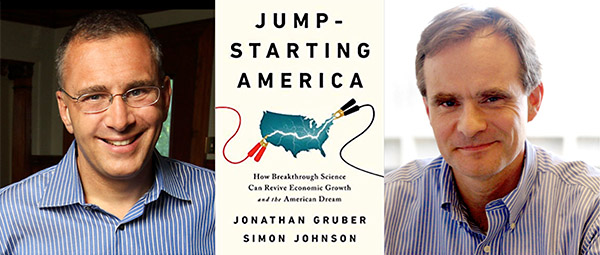
L: Jon Gruber; photo by Bill Greene/The Boston Globe; R: Simon Johnson, photo via MIT News
One of the most important lessons of the innovative post-1945 period in the US is that research and development drive productivity, better jobs, and higher incomes. And "government support for science," say Gruber and Johnson, "can create an economic tide that lifts all boats.”
REVIEWS OF JUMP-STARTING AMERICA
Investing in the brain
In their book, Jump-Starting America, MIT professors Jonathan Gruber and Simon Johnson have “produced a superbly argued case for public and private investment in education and research.” Review at the Wall Street Journal
How to make America grow again
“America desperately needs more hubs of growth, where talent and money can converge to create new industries,” write professors Jonathan Gruber and Simon Johnson. “It’s a problem that the government can and should address, by identifying and investing in the technologies of the future — and ensuring that the American people as a whole share in the gains.” Full story via Bloomberg News
Coastal tech hubs reign, but smaller U.S. cities offer an edge
MIT economists Simon Johnson and Jonathan Gruber identified 102 potential places which could develop into tech hubs if they received significant public investment. Topping their list of potential hubs are Pittsburgh, Columbus, Ohio, and Rochester and Syracuse in New York. Story at Bloomberg
'Jump-Starting America' As an Invitation to a Conversation with Economic Conservatives
"What I want to hear are your reasons why you think that Gruber and Johnson — two MIT economists — are getting things wrong. Before we go over the main arguments for the book, and before I try to convince everyone that this book is worth the investment in time to read, let's get clear about the types of conservatives I'd like to engage."
Inside Higher Ed
PROPOSING SOLUTIONS | MIT WORK OF THE FUTURE TASK FORCE
SPOTLIGHT BOOKS | CHANGE THIS
The Future of Work | A manifesto from Autor, Mindell, Reynolds
Three powerful economic voices from MIT write in a timely manifesto: "The remarkable history of American innovation was powered not by fear or fatalism, but by a profound sense of possibility. Those possibilities remain."
About the book
WORK AND THE PANDEMIC
The changing world of work
MIT Task Force on the Work of the Future responds to rapid changes brought by the pandemic.
Story at MIT News
ECONOMICS
MIT Economics receives Hewlett Foundation grant to study job quality
The generous grant will advance MIT's economic research on reimagining the relationships among markets, governments, and workers. Daron Acemoglu, Institute Professor, and David Autor, Ford Professor of Economics, co-lead the new Shaping the Future of Work Program.
Story
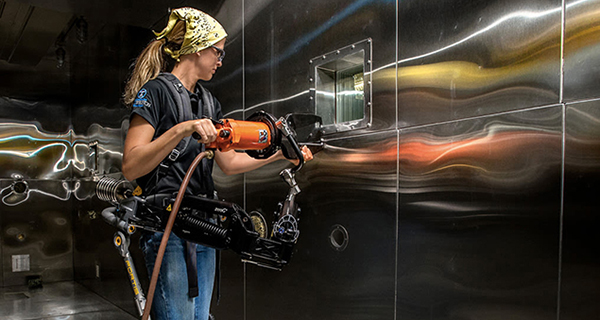
Industrial worker; photo via iStock
“Our research has helped examine the nation’s job quality crisis, which is foundational to many of the ills afflicting our society.”
HARNASSING TECHNOLOGY FOR SHARED PROSPERITY
MIT report examines how to make technology work for society
Task force calls for bold public and private action to harness technology for shared prosperity.
Story at MIT News
LOOKING AHEAD
MIT launches Task Force on the Work of the Future
This Institute-wide effort, which is studying the evolution of jobs in an age of technological advancement, is led by two SHASS Professors, economist David Autor and historian David Mindell — in collaboration with Elisabeth Reynolds, of the Industrial Performance Center. Their guiding premise is that the social and human implications of technology are a first concern.
Story at MIT News
THE FUTURE OF WORK
3Q: Daron Acemoglu on technology and the future of work
"We need to look to the past in the face of modern innovations in machine learning, robotics, artificial intelligence, big data, and beyond," says the economist.
Interview at MIT News
THE FUTURE OF WORK
Kathleen Thelen brings expertise to MIT's Work of the Future task force
“The task force will be putting the interaction of technology and society at the forefront,” says Thelen.
Story by Leda Zimmerman
GENDER EQUITY
Work of the future and the future of work for women in political science
Ford Professor Kathleen Thelen addresses challenges of the “gig economy” and gender equity issues in her field.
Story at MIT News
“The task force connects directly with my research to understand how new technologies and forms of work organization can be steered in ways that balance generating economic efficiencies with providing some level of social solidarity and equality."
— Kathleen Thelen, Ford Professor of Political Science
URBAN JOB LOSS
JOBS AND CITIES
Why aren't cities working for American workers? | David Autor
MIT economist Autor's recent research shows how economic polarization stems from urban job loss.
Story
LABOR ECONOMICS
The urban job escalator has stopped moving | David Autor
New study shows cities have stopped providing middle-class work in recent decades — and that Black and Latino workers are particularly affected by this decline.
Story by Peter Dizikes at MIT News | PDF of the Paper
ECONOMIC INEQUITIES
SOLVING ECONOMIC INEQUALITY
At MIT, Thomas Piketty calls for policies to reduce worldwide inequalities
Gives keynote address to the 2018 World Economic History Congress. "Rising inequality is highly correlated to unequal access to education. In the United States, 95 percent of those with parents at the highest income levels attend college, while only about 20 percent of the poorest do, research shows."
Story at SHASS News
HEALTH AND INCOME INEQUALITY
Income inequality is costing the U.S. on social issues | Heidi Williams
This New York Times article on the possible public health ramifications of rising inequality cites research by MIT economist Heidi Williams that finds a connection between infant mortality and “excess inequality.”
Article at The New York Times
CORPORATE INEQUALITY
The corporate world has its own inequality problem
It's easy to draw a line from company inequality to individual inequality: Superstar companies pay their own people well, but they are highly productive so they don't have a lot of employees per dollar of sales or profit. Workers lose, while capitalists win, concludes David Autor of MIT and four other authors.
Story at Bloomberg Businessweek
EQUITABLE FUTURE OF WORK
J-PAL NA launches initiative for a more equitable future of work.
Creating more equitable work requires reliable evidence about what approaches really work. J-PAL NA's new initiative aims to provide rigorous, actionable evidence via an "innovation competition" model.
Story | Apply | Info webinar | Bi-annual RFP
FORBES
Companies invest in automation to offset aging workforce | Daron Acemoglu cited
It might seem intuitive to assume that technology is adopted based primarily on the merits of the technology and its impact on things like productivity. That isn't, however, what new research from MIT shows. Instead, it argues that we tend to invest more in robotics and other automation-based technologies when our populations become older as employers strive to plug gaps in an aging workforce.
Story at Forbes | Daron Acemoglu
BLOOMBERG
Washington hasn’t learned the real lesson of the China shock | David Autor cited
Autor, Dorn, and Hanson documented how, while the China shock actually peaked in 2010, it was still being felt as recently as 2019. The economists endorse the view that for the U.S. economy as a whole, China’s rise has been beneficial. The problem is the job losses were concentrated intensely in places such as North Carolina’s furniture belt and factory towns in the Midwest — and the policies meant to help those places recover were too timid.
Story at Bloomberg | David Autor

Photo courtesy of J-PAL North America
THE TWO-TRACK U.S. ECONOMY
Escaping Poverty Requires 20 Years Plus | Peter Temin
In his new book The Vanishing Middle Class: Prejudice and Power in a Dual Economy, economist Peter Temin shows how the United States has split along economic lines into a two groups with vastly differing realities.
Story at the Atlantic | Story at Forbes | Story at The New York Times
America's two track economy | Peter Temin
Peter Temin, an economics professor at MIT, tackles the causes of poverty in the United States. In The Vanishing Middle Class: Prejudice and Power in a Dual Economy. Temin examines racism and substandard education, as well as the lack of a proactive infrastructure program. And he proposes solutions: expanding access to public education, investing in infrastructure, and forcefully confronting institutional mechanisms that perpetuate racial inequality.
Story at MIT News by Peter Dizikes | Story at The Atlantic | Story at Salon | Commentary at Times Higher Education
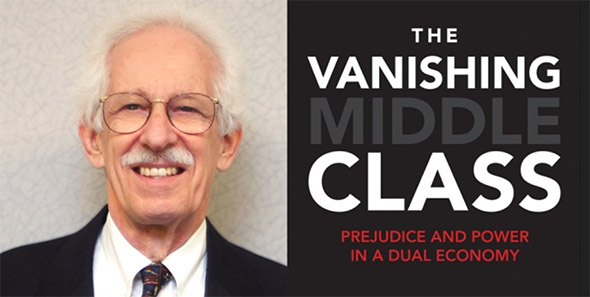
"The link between the two parts of the modern dual economy is education, which provides a possible path that children of low-wage workers can take to move into the FTE (finance, technology, electronics) sector."
— Peter Temin, Elisha Gray II Professor Emeritus of Economics, author of The Vanishing Middle Class, Prejudice and Power in a Dual Economy
DEINDUSTRIALIZATION
MANUFACTURING, JOBS, AND CHINA
Protectionism | David Autor
"In 1970, more than a quarter of U.S. employees worked in manufacturing. By 2010, only one in 10 did. The growth in imports from China had a role in that decline — contributing, perhaps to as much as one-quarter of the employment drop-off from 1991 to 2007, according to an analysis by David Autor and his colleagues at MIT. But the U.S. jobs slide began well before China's rise as a manufacturing power. The phenomenon is driven by technology.”
Story at the Huffington Post
AMERICAN JOBS
The American worker | David Autor
In 1979, middle-skill jobs accounted for 57 percent of the jobs in the U.S. economy, according to calculations by David Autor, an economist at the Massachusetts Institute of Technology. By 2009, the share was down to 46 percent.
Story at the Washington Post | Autor webpage
AMERICAN MANUFACTURING
Understanding the growing inequality in the U.S. | Christine Walley
"If you want to understand the expanding class inequality in the United States, one of the places you have to look is the long-term impact of deindustrialization. We have to think historically about how we got into this position and how we can come out of it.”
In 1980, Christine Walley’s world was turned upside down when the steel mill in Southeast Chicago where her father worked closed abruptly. In the ensuing years, thousands of other area residents would also lose their jobs in the mills—one example of the vast deindustrialization occurring across the U.S. The disruption propelled Walley into a career as a cultural anthropologist. In her book, Exit Zero, MIT anthropologist Christine Walley brings her anthropological perspective home, examining the human cost of deindustrialization in the American heartland.
Story + Video | About the Exit Zero Project | Trailer for Exit Zero video
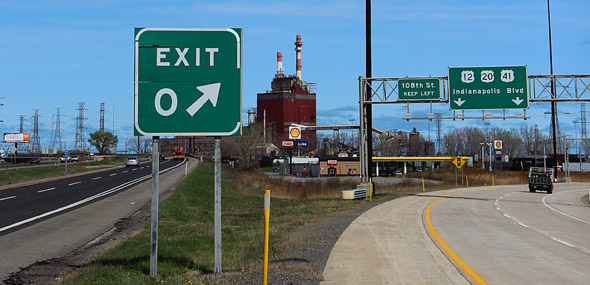
ECONOMICS AND MARRIAGE
When factory jobs vanish, men become less marriageable | David Autor
Economics Professor David Autor and a team of co-authors from other universities recently found that as men's economic prospects declined, there were fewer marriages in their communities due to the fact that “manufacturing jobs are a fulcrum on which traditional work and family arrangements rest.”
Story at The Atlantic | Related stories at Bloomberg and The Washington Post
PRODUCTION IN THE INNOVATION ECONOMY
MIT PIE Report released | Making in America by Suzanne Berger 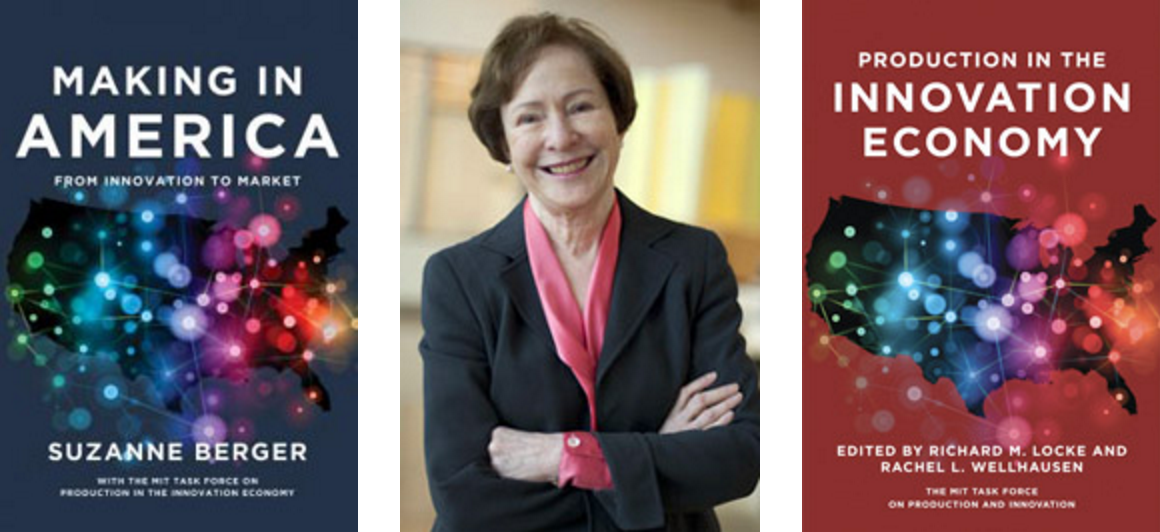
America is the world leader in innovation, but many of the innovative ideas that are hatched in American start-ups, labs, and companies end up going abroad to reach commercial scale. When innovation does not find the capital, skills, and expertise it needs to come to market in the United States, what does it mean for economic growth and job creation? Inspired by the MIT Made in America project of the 1980s, Making in America brings experts from across MIT to focus on a critical problem for the country.
The PIE commission found that potentially valuable innovations occur throughout the advanced manufacturing sector—from academic labs to shop floors—and in companies of all sizes, from multinational conglomerates to specialized “Main Street” firms. However, there are holes in the “ecosystem” of advanced manufacturing in the United States—gaps that particularly inhibit innovative smaller firms. The report suggests that new policies, partnerships and programs can help create innovation-based growth and jobs. Many of the results are detailed in Making in America (MIT Press, 2013), written by Suzanne Berger, with the PIE Task Force. Berger is the Raphael Dorman-Helen Starbuck Professor of Political Science, and a co-chair of the MIT PIE Commission.
Story at MIT News | Making in America (MIT Press, 2013) | 3Q with Suzanne Berger | Slice of MIT
TRADE AND GLOBALIZATION
ECONOMICS | TRADE
The long afterlife of the “China shock” | David Autor
Economist Autor's new research shows that the U.S. locales hammered by open trade with China have not yet rebounded. "The forward-looking lesson is about adjustment for unemployed workers and hard-hit areas," Autor says. "Because we’re not done with it. If China’s exports were encased in lucite tomorrow, we’d still have lots of economic shocks going forward."
Interview by Peter Dizikes | Paper: On the Persistence of the China Shock
U.S. JOB LOSS AND POLITICAL POLARIZATION
3 Questions: David Autor on global trade and political polarization
Study finds relationship between U.S. job losses due to trade, and political polarization in Congress.
Story at MIT News
IMPACT OF TRADE ON LABOR MARKETS
What a more equitable US trade policy could look like | David Autor
“International trade creates diffuse benefits and concentrated costs,” says MIT economist David Autor. “China’s rapid rise, while enormously positive for world welfare, has created identifiable losers in trade-impacted industries and the labor markets in which they are located.”
Story at the New York Times
ECONOMICS AND TRADE
Trade deficit is a poor measuring stick for the economy
The Washington Post quotes MIT economist David Autor in its analysis of Trump’s trade philosophy. As Autor explains, “You have to understand the fundamental reason for trade is not because you win by exporting and lose by importing — it’s that there are things that other countries make that you want to buy, and things you make that they want to buy.”
Story at the Washington Post | Related Story at the WaPo
GLOBALIZATION
Is the American middle class losing out to China and India?
Entering the fray, three economists — David Autor of MIT, David Dorn of the Center for Monetary and Financial Studies in Spain, and Gordon Hanson of the University of California, San Diego — have analyzed the employment consequences of globalized trade and technological advance.
Story at The New York Times
TRADE
Venerable Theory of Comparative Advantage put to new uses | Arnaud Costinot
With the growth of China and Latin American economies, among others—many dissimilar countries, with wildly varying institutions, are trading with each other. “The comeback of Ricardian theory today is, in part, as a response to those trends,” Costinot says. Trade between developed and less-developed economies “is on the rise and it seems to be quite different. We may need new theories, or old theories and their extensions may be better suited to it.”
Story
THE IMPORT OF IMPORTS
When giants slow down | Acemoglu, Autor, Price
The most dramatic, and disruptive, period of emerging-market growth the world has ever seen is coming to its close. MIT's Daron Acemoglu, David Autor, Brendan Price, and others argue that the sag in employment growth in America in the 2000s is traceable in large part to the country's unreciprocated taste for Chinese imports.
Story
NOBEL PRIZE | FAIR AND WISE AGREEMENTS
MAKING FAIR CONTRACTS
MIT economist Bengt Holmström receives Nobel Prize in Stockholm
Story + Videos from the Lecture and Ceremony
Video of the Nobel Prize Lectures in Economics
MIT Economist Bengt Holmström on his Nobel Prize-winning ideas for making fair and wise human agreements | Thursday, 8 December 2016. Professor Holmström's lecture starts at 29:40.
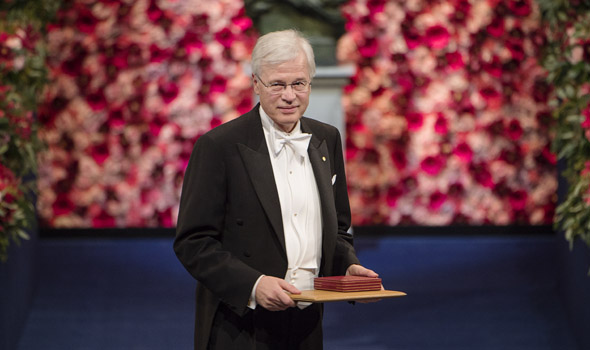
Bengt Holmström, Paul A. Samuelson Professor of Economics, upon receiving the Nobel Prize, December 10, 2016, in Stockholm; Photo © Nobel Media AB 2016/Pi Frisk
NOBEL PRIZE | FOUNDATIONS OF NATURAL EXPERIMENTS
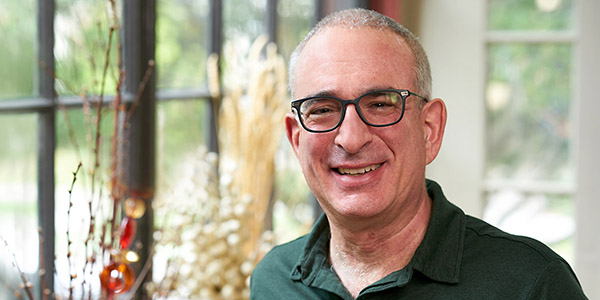
Joshua Angrist, Ford International Professor of Economics at MIT; photo by Lillie Paquette
ECONOMICS
MIT economist Joshua Angrist shares the 2021 Nobel Prize in Economic Science
Cited for work building the foundations of “natural experiments” in economic research, Angrist, the Ford International Professor of Economics at MIT, and Guido Imbens, Professor of Economics at Stanford University, received the award for their “methodological contributions to the analysis of causal relationships,” alongside David Card for his work on labor economics.
Story: A revolution in economics | Story at MIT News | Angrist's Nobel telephone interview
ROBOTS AND JOBS
ECONOMICS
A three-part series on the effects of robots and automation on employment
Based on new research from economist and Institute Professor Daron Acemoglu:
How many jobs do robots really replace? Story
Study finds stronger links between automation and inequality. Story
Robots help some firms, even while workers across industries struggle. Story
ROBOTICS AND JOB CREATION
The robot debate is over: the jobs aren't coming back | David Autor
The Guardian explores the impact of automation on U.S. employment, citing MIT economist David Autor as “the most influential proponent” of the argument that new technology ultimately creates as many jobs as it destroys.
Story at The Guardian
ROBOTICS AND JOBS
Are robots really coming for your job?
Today's workforce is sharply divided by levels of education, and those who have not gone beyond high school are affected the most by long-term changes in the economy, says David Autor, an MIT professor of economics. “It's a great time to be young and educated. But, Autor says, there's no clear land of opportunity” for adults who haven't been to college.
Story at Fast Company
THE NEW YORK TIMES
Economists look at the role of tech in rising inequality | Daron Acemoglu
Acemoglu has been making the case against what he describes as “excessive automation...We need to redirect technology so it works for people,” Mr. Acemoglu said, “not against them.”
Story at The New York Times
FORBES
Work Of The Future: better jobs in an age of intelligent machines | David Mindell
Mindell writes, "How distant seem the days of 2018, when techno-pundits grew so alarmed at the hype of technology that they worried the end of human work was only a few years away."
Commentary at Forbes
FAST COMPANY
Less than 35% of $800 billion PPP loans went to workers | David Autor and colleagues
A study co-authored by MIT economists estimates that only “somewhere between 23% and 34% of PPP dollars went to workers who would’ve otherwise lost their jobs. The rest...landed in the pockets of either the company’s owners or shareholders.”
Story at Fast Company | Conversation at WBUR
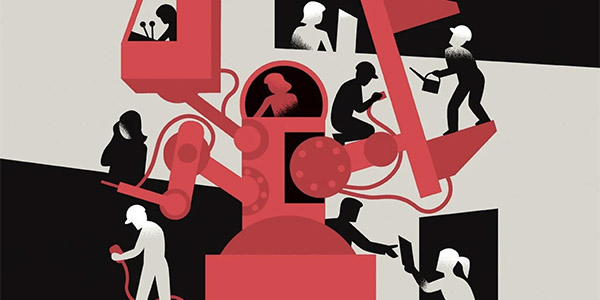
Illustration by Otto Dettmer, The Economist
THE ECONOMIST
Economists are revising their views on robots and jobs
Graduate student Joonas Tuhkuri finds that at Finnish firms “adoption of advanced technologies led to increases in hiring.” Meanwhile a new book by David Autor, David Mindell, and Elisabeth Reynolds concludes that “even if robots do not create widespread joblessness, they may have helped create an environment where the rewards are ‘skewed towards the top.”
Story at The Economist | About the book: The Work of the Future (MIT Press)
FORBES
AI creates job disruption, not job destruction | Task Force on the Work of the Future
It's a level of disruption that is echoed by a report from MIT's Task Force on the Work of the Future, which...reminds us that over 60% of the jobs of today did not exist a generation ago, with technology driving an evolution in the kind of work we do."
Story at Forbes
WIRED
Now you can rent a robot worker—for less than paying a human | Daron Acemoglu
It’s unclear—even to economists—what impact the growing use of robots will have on the supply of jobs. Research from Daron Acemoglu and Pascual Restrepo, economists at MIT and Boston University, respectively, suggests that the adoption of robots from 1990 to 2020 resulted in fewer jobs and lower wages overall.
Story at Wired
FINANCIAL TIMES
Automation exacts a toll in inequality | Daron Acemoglu
Politicians and policymakers are homing in on the work of MIT professor Acemoglu, who testified at a select committee hearing to the US House of Representatives in November that automation is responsible for 50-70 per cent of the economic disparities experienced between 1980-2016.
Story at The Financial Times
ROBOTICS AND JOBS
Are we prepared for the robot apocalypse? | Daron Acemoglu
The Washington Post reports on new research co-authored by MIT economist Daron Acemoglu, which finds that industrial robots eliminated up to 670 thousand American jobs between 1990 and 2007.
Story at The Washington Post
ROBOTICS AND JOBS
How many robots does it take to replace a human job? | Daron Acemoglu
The Atlantic reports on a new study co-authored by Daron Acemoglu, Elizabeth and James Killian Professor of Economics at MIT, which finds that each new robot replaces three human workers.
Story at The Atlantic
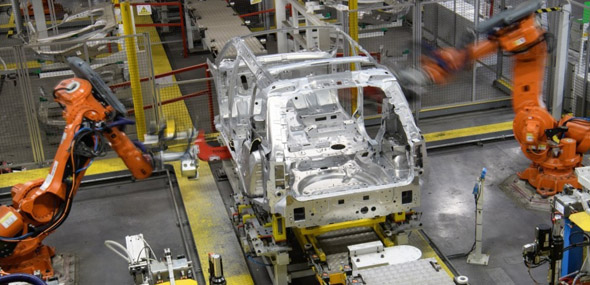
Robotic systems work on a car, Jaguar Land Rover factory, Solihull, England. Photo: Leon Neal, Washington Post
ROBOTICS AND THE FUTURE OF JOBS
How the rise of the robots will affect the future of jobs | David Autor
It’s a good time to have specialized skills and a tough time to have “ordinary “skills, says MIT economist David Autor. According to Autor, “Computers robots, and other digital technologies are acquiring [traditional workers’] skills and abilities at an extraordinary rate.”
Story at CNBC | Story at CBS News
ROBOTICS AND JOBS
Most workers have held off the machines | David Autor and Brendan Price
Jobs with very routine tasks have declined in the U.S., according to a paper by economists David Autor and Brendan Price, entitled “The Changing Task Composition of the U.S. Labor Market.”
Story at Bloomberg
IMPACT OF ROBOTICS ON AMERICAN JOBS
Evidence that robots are winning the race for American jobs | Daron Acemoglu
Journalist Claire Cain Miller calls a new publication co-authored by MIT economist Daron Acemoglu “the first study to quantify large, direct, negative effects of robots.”
Story at The New York Times
GRAPPLING WITH TECHNOLOGICAL CHANGE
Technology, Jobs, and the Middle Class | David Autor and David Dorn
"Computerization is not reducing the quantity of jobs, but rather degrading the quality of jobs for a significant subset of workers....This bifurcation of job opportunities has contributed to the historic rise in income inequality. The good news is that middle-wage jobs are not slated to disappear completely.... How can we help workers ride the wave of technological change rather than be swamped by it?"
Commentary in the New York Times
HUMAN-CENTERED ROBOTICS
David Mindell on human-centered robotics, autonomy, and bilingual education
"Decades of experience have taught us that to function in the human world, autonomy must be connected, relational, and situated. Human-centered autonomy in automobiles must be more than a fancy FitBit on a driver; it must factor into the fundamental design of the systems: What do we wish to control? Whom do we trust? Who owns our data? How are our systems trained? Mindell is the Dibner Professor of the History of Engineering and Manufacturing (in MIT-SHASS), a Professor of Aeronautics and Astronautics (in MIT Engineering), and the Co-founder and CEO of Humatics Corporation.
3 Questions Interview
The peculiar economics of autonomous cars | David Mindell
Autonomous does not mean humanless. In Our Robots, Ourselves: Robotics and the Myths of Autonomy, MIT historian and aero-astro engineer Mindell explains why. “There are no fully autonomous systems,” he argues. “The machine that operates entirely independently of human direction is a useless machine.”
Story at Financial Times
HUMAN-CENTERED ROBOTICS
David Mindell on the human dimensions of technological innovation
“The new success of robots will depend on how well they situate into human environments; as in chess, the strongest players are often the combinations of human and machine. I increasingly see that the three critical elements are people, robots, and infrastructure — all interdependent."
Interview
“The new frontier is learning how to design the relationships between people, robots, and infrastructure. We need new sensors, new software, new ways of architecting systems.”
— David Mindell, Dibner Professor of the History of Engineering and Manufacturing, and Professor of Aeronautics and Astronautics
SOLVING INEQUALITY
INCOME INEQUALITY
Inequality offensive
At MIT forum, economists evaluate the consequences of increasing inequality in America, and suggest solutions.
Story by Peter Dizikes at MIT News
EQUALITY AND EDUCATION
Education really does reduce inequality | David Autor
This article cites MIT economist David Autor, whose research indicates that an increase in wages for the top 1% between 1980 and 2005, if divided among the bottom 99%, would provide each household about $7,000 in additional income.
Article at the Wall Street Journal
WAGES
Big Mac test shows job market is not distributing wealth
If the job market — that most critical institution of capitalist societies, the principal vehicle to distribute the nation’s wealth among its people — cannot keep hardworking people out of poverty and spread prosperity more broadly, how will it be done? Article quotes MIT economist David Autor.
Story at the New York Times
INCOME INEQUALITY
What can be done about income inequality? | Robert Solow
Redistributing income with taxes and transfers is largely failing to close the income gap. Perhaps it’s time to try a corporate approach.
Story at the New York Times
ECONOMICS AND THE AMERICAN MIDDLE CLASS
On the state of the American dream | Solow
This U.S. News article on inequality and middle-class stagnation quotes MIT economist Robert Solow, who says, “evidence of the importance of the digital revolution is everywhere except in the productivity numbers.”
Story at US News
WORK AND SOCIAL INSURANCE
Caught in the social safety net | Andrea Campbell
Campbell gives a firsthand perspective on the effects of means-tested social insurance programs. “Work has a high cost, because as you start earning income, you lose eligibility for programs,” Campbell says, noting that for everyone without a remarkable long-term care insurance policy, long-term services and support are “extraordinarily expensive, beyond [their] means.” To change that dynamic, Campbell thinks we should either raise the asset threshold or drop means-testing.
Story at MIT News | Commentary in The New York Times
INEQUALITY AND POLITICS
Five reasons why income inequality is now a major political issue | David Autor
"Computer software and industrial machines now fill roles — from clerical tasks to routine manufacturing — that once produced middle-class incomes for workers without college degrees. It has simultaneously devalued a lot of cognitively repetitive tasks in offices and on production lines.'"
Story + Video at CNBC
"The digital revolution creates enormous wealth for those with the skills and preparation to take advantage, but it eliminates what economists call 'middle-skill' jobs."
U.S. JOB MARKET
Polarized labor market shifting more American employees to low skill, low growth jobs
New study by MIT economist David Autor, and economist David Dorn, reveals the U.S. job market is shifting more workers into positions with limited upside, leverage, and rewards.
Story
GROWTH WITH EQUALITY
A new path for growth | Ben Ross Schneider
In Hierarchical Capitalism in Latin America, MIT political scientist Ben Ross Schneider sets out an agenda for growth with greater equality in Latin America. Schneider is Ford International Professor of Political Science and director of the MIT-Brazil program.
Story
RECESSION AND TWO AMERICAS
A tangled fate of prosperity and struggle | Daron Acemoglu
For MIT Economist Acemoglu, the co-author of Why Nations Fail, the split personality of these years of crisis and recovery is “no puzzle.” “The United States is still the most innovative country in the world,” he said. The problem, he says, is that the innovations produced by the thriving set don’t necessarily translate into jobs for struggling people.
Story at The New York Times
SOLVING INEQUALITY
Ten Ways to Get Serious About Rising Inequality | Peter Diamond, Emmanual Saez
From point 4 of 10: "In a 2011 paper that sparked an interesting debate, Peter Diamond, Professor of Economics emeritus, and Emmanuel Saez of Berkeley [MIT PhD in Economics '99] argued that, based on the costs and benefits to society as a whole, [the top tax rate] should be set at seventy-three per cent—a bit below the level in the nineteen-fifties, but well above today's rate."
Article in The New Yorker
LABOR MARKET
Working in America | Michael Piore
The American labor market faces many deep-rooted problems, including persistence of a large low-wage sector, worsening inequality in earnings, employees' lack of voice in the workplace, and the need of employers to maximize flexibility. This book traces today's labor-market policy and laws back to the New Deal and to a second wave of social regulation that began in the 1960s.
About
ENVISIONING THE FUTURE
What’s the future of wealth — and inequality? | Thomas Piketty
At MIT, Eeconomist Thomas Piketty presents and defends work on inequality. Piketty was an assistant professor at the Institute from 1993 to 1995, and returned as a visiting professor in the 2000-2001 academic year. He has also co-authored articles with multiple MIT scholars.
Story at MIT News | Related from The Guardian: Why is Piketty's book a bestseller?
INVESTING IN CITIZENS IS THE BEST POLICY
Q&A | U.S. inequality issues among the “99 percent”
In an article in Science, MIT economist David Autor moves the U.S. inequality discussion beyond the 1% vs. 99% comparison. In the long run, he says, "the best policies we have to combat inequality involve investing in our citizenry. Higher education, and public education, is America’s best idea. Those investments also include preschool, good primary and secondary schools, and adequate nutrition and health care."
Story by Peter Dizikes at MIT News
INVESTMENT IN ENERGY AND INFRASTRUCTURE
INFRASTRUCTURE AND THE ECONOMY
Nobel laureate: Long path to economic renewal, but energy innovation could help
Robert Solow, Professor of Economics emeritus says investments in energy and infrastructure could help revive the economy.
Story by Peter Dizikes at MIT News
ECONOMICS
How much does infrastructure boost an economy? | David Donaldson
Donaldson's acclaimed, innovative study, "Railroads of the Raj," which details how railroads helped India trade and grow, may also speak to the importance of infrastructure more broadly. In the U.S., debate rolls on about the value of building and refurbishing America’s roads, bridges, railroads, ports, and airports.
Story at MIT News | Donaldson receives 2017 Clark Medal
ECONOMICS AND CLIMATE CHANGE
3 Questions | Benjamin Olken on the economic impact of climate change
How is climate change going to affect our economic activity in the future? MIT economist Ben Olken has co-authored a new survey on the burgeoning research about the effects of the changing climate.
Story

"There has been a lot of emphasis on studying the effects of climate change on agriculture. But if it’s affecting other aspects of the economy — like industrial output, investment, and innovation — the long-run impact could be much bigger."
— Ben Olken, MIT Professor of Economics
GLOBALIZATION
When (and where) work disappears
Study: Overseas manufacturing competition hits U.S. regions hard, leaving workers unemployed for years and local economies struggling.
Story
LABOR MARKET
Incremental reforms could make capitalism a more equitable system | Kathleen Thelen
In Varieties of Liberalization and the New Politics of Social Solidarity, MIT political scientist Kathleen Thelen examines contemporary changes in labor market institutions in the United States, Germany, Denmark, Sweden, and the Netherlands, focusing on developments in three arenas: industrial relations, vocational education and training, and labor market policy. Thelen finds that there are distinct varieties of liberalization associated with very different distributive outcomes.
About the book | Interview with Thelen
ARTISANAL PRODUCTION
The Life of Cheese: Crafting Food and Value in America | Heather Paxson
An anthropological study of American artisanal cheese and the people who make it. Cheese is alive, and alive with meaning. This study tells the story of how craftwork has become a new source of cultural and economic value for producers as well as consumers. By exploring the life of cheese, Paxson helps rethink the politics of food, land, and labor today.
Life of Cheese website | University of California Press | Video: Paxson on artisan cheese

WOMEN AND ENGINEERING
Why do women leave engineering?
Study: Group dynamics of teamwork and internships deter many women in the profession.
Story at MIT News
DIVERSITY IS EFFICIENT
Workplace diversity can help the bottom line | Sara Ellison
MIT economist scrutinizes firm data suggesting diverse offices function more effectively.
Story by Peter Dizkies at MIT News
Reality check in the factory
MIT professor’s new book shows how labor laws actually get enforced, globally.
Story
ECONOMICS AND DEMOCRACY
The Democracy Dividend: Faster Growth | Daron Acemoglu
Countries that democratize — switch from a nondemocratic regime such as a dictatorship, monarchy, or autocracy to a democratic regime — grow more rapidly in the next 20 years or so, and end up with 20 percent higher income per capita.
Bloomberg News
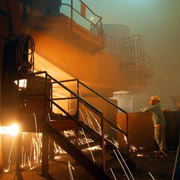
Prepared by MIT SHASS Communications
Office of the Dean
Communications Director: Emily Hiestand
First published 2015, updated annually
